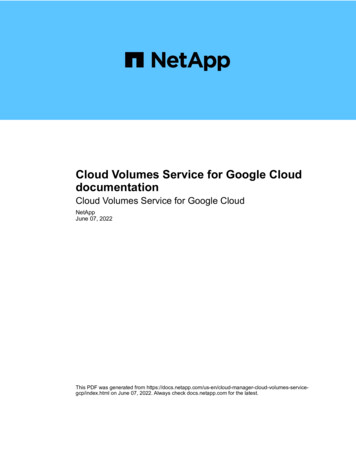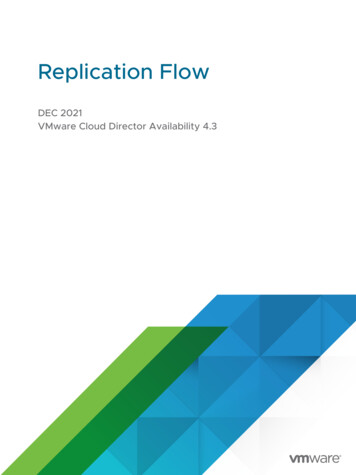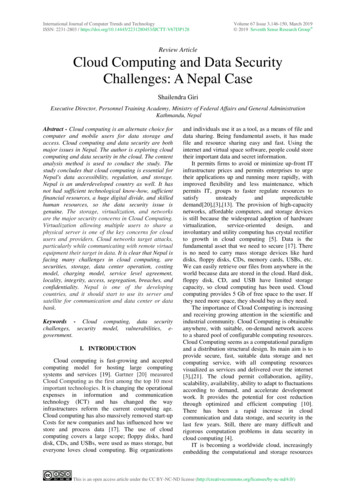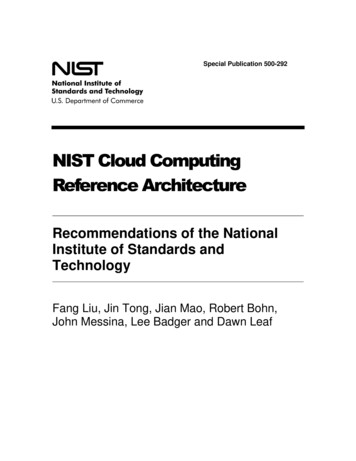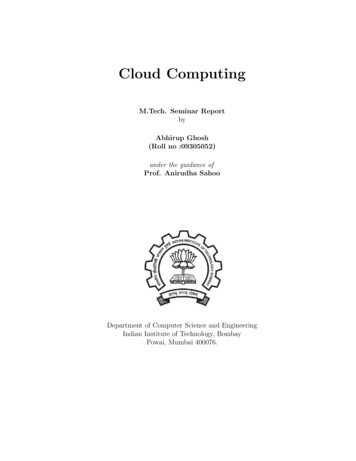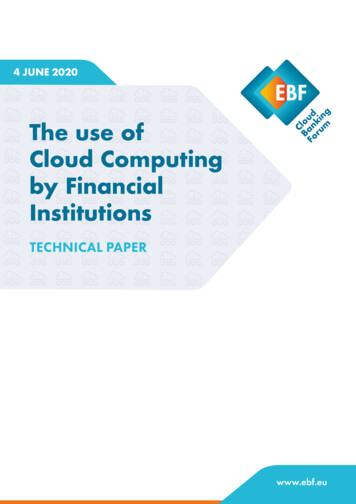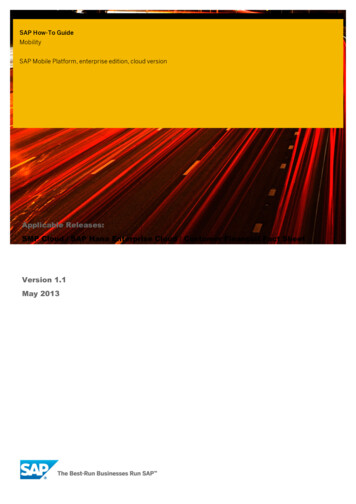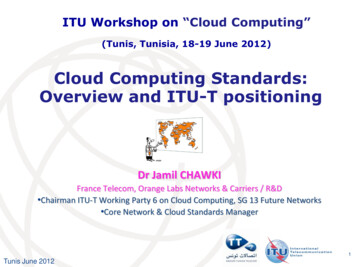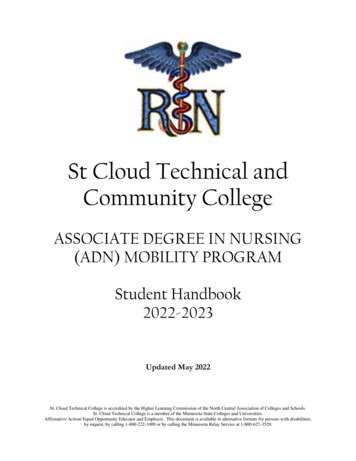
Transcription
St Cloud Technical andCommunity CollegeASSOCIATE DEGREE IN NURSING(ADN) MOBILITY PROGRAMStudent Handbook2022-2023Updated May 2022St. Cloud Technical College is accredited by the Higher Learning Commission of the North Central Association of Colleges and Schools.St. Cloud Technical College is a member of the Minnesota State Colleges and Universities.Affirmative Action/ Equal Opportunity Educator and Employer. This document is available in alternative formats for persons with disabilities,by request, by calling 1-800-222-1009 or by calling the Minnesota Relay Service at 1-800-627-3529.
WELCOME to the St. Cloud Technical & Community College (SCTCC) Associate Degree inNursing Mobility Program Student Handbook! We are excited that you have chosen to pursueyour nursing career with us. I want to introduce you to our program and its history.St. Cloud Technical & Community College is accredited by the Higher Learning Commissionof the North Central Association of Colleges and Schools. The Associate Degree in NursingMobility program was established in the fall of 2010 and is approval by the Minnesota Boardof Nursing (www.nursingboard.state.mm.us). The program is nationally accredited byNational League for Nursing Commission for Nursing Education Accreditation (NLN CNEA)and has been since 2019 (www.nln.org). We are proud of our long history and excited for ourfuture as we continue to excel in the area of nursing education. The faculty and staff are hereto support you as you pursue your Associate Degree in Nursing education.The St. Cloud Technical & Community College Associate Degree in Nursing StudentHandbook has been prepared to help you learn about the structure, expectations, and policiesof the Associate Degree in Nursing Program. It also provides the framework for the academicand clinical laboratory policies and requirements in order to maintain an effective andefficient program.The St. Cloud Technical & Community College Student Handbook addresses the policies forall students enrolled in the College, including nursing students. Associate Degree in Nursingstudents are to refer to the St. Cloud Technical & Community College Student Handbook forall information that is not specific to the Associate Degree in Nursing program. Thishandbook can be found on the SCTCC website.Please take the time to read and familiarize yourself with the SCTCC Associate Degree inNursing Student Handbook. It is your responsibility to know the content of the handbook andthe St. Cloud Technical & Community College Student Handbook, please be sure to saveboth handbooks so that you can refer to them in the future.Again, I want to say welcome to St. Cloud Technical & Community College AssociateDegree in Nursing Mobility Program. The nursing faculty and I look forward to the comingyear in partnership with you. Please seek the counsel of faculty or advisors if you have anyquestions about the program or college policies.Sincerely,Connie Frisch, Ed.D, MA, RNDirector of Nursing1
Disclaimer:Every effort has been made to ensure the accuracy of the material contained within thishandbook. However, all policies, procedures, clinical information/documentation, programinformation, and fees are subject to changes at any time by appropriate action of the faculty,the college administration, the Director of Nursing, the Dean of Health Sciences, theMinnesota State Colleges and Universities Board of Trustees, the Minnesota Board ofNursing, or the Minnesota Legislature without prior notification. The provisions of theAssociate Degree in Nursing Student Handbook do not constitute a contract between thestudent, the college, or the Associate Degree in Nursing Program. The information in thishandbook is for use as an academic tool and is subject to change at any time. The AssociateDegree in Nursing Student Handbook may undergo changes following a student’s admissionand progression in the Associate Degree in Nursing program. Students will be responsiblefor and held to changes in the handbook. Nursing students will be notified of handbookchanges in writing, announcements in class and on D2L.2
PREFACESt. Cloud Technical and Community CollegeAssociate Degree in Nursing (ADN) Mobility ProgramStudent HandbookThis policy handbook provides information specific to the Associate Degree in Nursing MobilityProgram. The information will be useful to you as you enter, progress through, and exit theprogram and will help you be a more successful student.The policies presented in this handbook supplement those presented in the St. Cloud Technicaland Community College Catalogue. All students are expected to read the handbook and retain acopy of the handbook throughout the program. The handbook is updated and posted on theprogram web page on an annual basis.The Nursing Faculty reserve the right to update the policies in this book as the need should arise.Policy changes will be provided in writing and announced in classes. Students are encouraged toseek the counsel of course instructors or advisors if they have any questions about the policiespresented in this publication.The St. Cloud Technical & Community College Associate Degree in Nursing program isaccredited by: National League for Nursing Commission for Nursing Education Accreditation(NLN CNEA) 2600 Virginia Avenue NW, Washington, DC 20037202-909-2526.3
TABLE OF CONTENTSSECTION I: INTRODUCTION . 7FACULTY AND STAFF . 8ST. CLOUD TECHNICAL & COMMUNITY COLLEGE VISION AND MISSION. 9ST. CLOUD TECHNICAL & COMMUNITY COLLEGE NURSING MISSION ANDPHILOSOPHY . 9NURSING PROGRAMS CURRICULUM MODEL . 10National League for Nursing Core Values .10National League for Nursing Integrating Concepts . 11Student Learner Outcomes. .12ST. CLOUD TECHNICAL & COMMUNITY COLLEGE LEARNER OUTCOMES . 13NURSING PROGRAM OUTCOMES . 14MINNESOTA STATE PERFORMANCE STANDARDS FOR ENTRY-LEVEL NURSINGPROGRAMS . 14ASSOCIATE DEGREE NURSING MOBILITY PROGRAM PLAN. 15SECTION II: ASSOCIATE DEGREE MOBILITY PROGRAM ADMISSION INFORMATION . 16ADMISSION STANDARDS FOR ASSOCIATE DEGREE NURSING MOBILITY PROGRAM . 17Acceptance Process . 17Transfer of Credits Policy . 18After Application . 18After Acceptance or Placement on Alternate or Waiting List . 18Registration Procedures . 19SECTION III: GENERAL POLICIES AND PROCEDURES . 20CLINICAL SITES . 21DATA PRACTICES AND INFORMED CONSENT . 21CLINICAL REQUIREMENTS . 21Criminal Background Studies . 22Immunization Records/Student Health Records . 22Performance Standards (Physical, Cognitive, and Psychosocial Requirements) . 22Name and Date of Birth . 23Liability Insurance . 23Authorization for the Release of Student Information . 24CPR Certification . 24Health Insurance . 24Licensure .24DRUG AND ALCOHOL POLICY . 24EMAIL AND TECHNOLOGY . 24NAME TAGS . 25PERSONAL HEALTH RISKS . 25ACADEMIC COUNSELING . 25REASONABLE ACCOMMODATIONS . 26RESPONSIBILITY FOR HEALTH CARE COSTS . 26ADDITIONAL COSTS . 27WORKERS’ COMPENSATION . 27SECTION IV: PROGRAM EXPECTATIONS . 28ACADEMIC PROGRESSION/GRADUATION REQUIREMENTS. 29Statement of Integrity . 294
Academic Integrity .29MORAL AND ETHICAL RESPONSIBILITIES . 29Social Media Policy 30Due Process .32Chain of Command 32SCTCC Campus Policy: Complaint/Grievance Policy .32SCTCC Equal Opportunity Employer Statement .33EVALUATION CRITERIA . 35Course Evaluation Criteria . 35Written Evaluation (Exams, Tests or Quizzes) Criteria . 35Project and Assignments Evaluation Criteria . 36ATI Requirements 36Clinical Laboratory Evaluation Criteria .36Documentation of Classroom, Lab and Clinical/Practicum Performance . . .36Academic Progression/Graduation Requirements . 36Withdrawal Procedure .37Procedure for Repeating Failed or Withdrawn Courses .37Procedure for Readmission . 38Attendance Policy . 38Clinical Absence Policy . .39CLINICAL EXPERIENCE, RESPONSIBILITIES AND UNIFORM . 39Clinical Dress Code . . .40Scent Free .41CLINICAL LABORATORY PERFORMANCE. 41SIMULATION IN HEALTH CARE EDUCATION . 41SECTION V: SIMULATION AND NURSING SKILL LAB POLICIES . 42UTILIZATION OF NURSING LABS IN HEALTHCARE EDUCATION . 43Purpose of Nursing Skill/Simulation Labs. 43Mission of Nursing Skill/Simulation Labs. 43Goals of Nursing Lab/Simulation Lab . 43GENERAL POLICIES OF THE NURSING SKILL/SIMULATION LABS . .44Access to Lab . 44Lab Equipment and Computers . 45Simulation Preparedness . 45Manikins . 45Simulation Lab Scenarios . 45Safety In Laboratory Settings . 46Physical Safety . 46Hazardous Waste Disposal. 46Infection Control . 46Latex Warning . 47SECTION VI: APPENDICES & FORMS. 48Appendix A: Nursing Code of Ethics . 49Appendix B: Minnesota State Cognitive, Psychomotor, and Physical Guidelines for Nursing (AD) 50Appendix C: Legal Definitions of Nursing .51Appendix D: AD Program Estimated Expenses. .535
Appendix E: Consent to use student academic work .54Appendix F: Simulation Participation Form . . .55Appendix G: Due Process Form . .56Appendix H: Student Success Plan .57Appendix I: Social Media Policy Form 606
SECTION I: INTRODUCTION7
St. Cloud Technical and Community CollegeAssociate Degree in Nursing (ADN) ProgramFaculty and Staff DirectoryFaculty and StaffDEAN OF HEALTH SCIENCESAND NURSINGShanda Davis, Ph.DPhoneRoomE-mail320-308-5538Laurie Jensen (July 1st)DIRECTOR OF NURSINGConnie Frisch, EdD, RNJennifer Knaack, MSN, RN (July 1st)320-308-6639126C -308-5935320-308-5085139C139H139F139DNURSING FACULTYKim Becker, MA, RNJackie Brambrink, MSN, RNCarolyn Neubauer, MSN, RNMichele Stumpf, MSN, ubauer@sctcc.edumstumpf@sctcc.eduSTAFFRyan Welle, Dean’s Admin AssistantJudy Plumski, Nursing Lab e@sctcc.eduJudith.plumski@sctcc.eduThe preferred method of communication is via the sctcc.edu e-mail system. Please check your email account on a regular basis for communication. The e-mail method of communication isrecommended for corresponding with faculty or to set up appointments with faculty. Facultyoffice hours are posted on their office doors.8
ST. CLOUD TECHNICAL & COMMUNITY COLLEGE VISION AND MISSIONVision StatementWe are a community of learners rooted in meaningful relationships where everyone belongs andthrives.Mission StatementWe provide the education, training, and support necessary for equitable participation in oursociety, economy, and democracy.SCTCC's Shared Beliefs Education empowers individuals and transforms generations. Every individual has intrinsic value and every voice deserves to be heard. Our differences enrich our community. An antiracist and antidiscrimination ethos is necessary for advancing social justice andequity. It is our responsibility to ensure equitable outcomes for our students. Each student cansucceed. Innovation, flexibility, and life-long learning are critical for our community to thrive. Mutually accountable relationships built on trust are essential for our success. Community partnerships strengthen and sustain us.ST. CLOUD TECHNICAL AND COMMUNITY COLLEGE ASSOCIATE DEGREE INNURSING MOBILITY PROGRAM MISSION STATEMENTThe St. Cloud Technical and Community College’s (SCTCC) Associate Degree in Nursing(ADN) Mobility Program provides accessible nursing education to prepare safe, caring, andcompetent entry-level professional nurses that provide care to diverse populations in rural andurban communities.NURSING PROGRAM PHILOSOPHYThe philosophy of the SCTCC Nursing Programs is congruent with the mission, vision, and corevalues of the St. Cloud Technical and Community College’s which are committed to: quality education, continuous improvement, and responsiveness to the local communityand industry; commitment to a teaching/learning environment that sustains innovation,technology, educational excellence, and lifelong learning; providing educational opportunities and affordable access to a diverse student body; staff development, availability, and success; and offer nursing programs that provide students with a gateway to pursue higher levels ofeducation through articulation. Cultivating a culture where relationships are based on trust, mutual accountability, andantidiscrimination to advance social justice and equity in health care. Recognizes each individual has their own story and deserves to reach their highestpotentialThe nursing faculty believes that nursing is both an art and a science; a profession guided byscientific principles and the core values for the National League for Nursing (NLN), whichincludes caring, diversity, excellence, and integrity (2018).Nursing is devoted to promoting, maintaining, and restoring the health of individuals andfamilies, as well as promoting a peaceful, dignified death. Registered Nurses (RN) care fordiverse individuals and families across the lifespan in a variety of in-patient and community9
based settings by providing safe, culturally sensitive, individualized, patient-centered care and byparticipating as a member of the health care team.RN’s recognize that teamwork and interdisciplinary collaboration among health careprofessionals is critical to delivering safe, quality patient care. As a member of the health careteam, RN’s maintain a spirit of inquiry to continuously improve quality and safety of health carethat is evidence based. Through the use of informatics and technology, RN’s make soundnursing judgment in the delivery of safe, patient-centered care.Professional values guide interactions with individuals, families, and the health care team. RN’sdemonstrate professional identity by exhibiting professional behaviors such as accountability,integrity, and assuming ethical and legal responsibility for the care they provide. RN’s continueprofessional growth and development through lifelong learning.CURRICULUM MODELThe curriculum model of the SCTCC nursing programs is guided by the core values, integratingconcepts, program outcomes, and nursing practice developed by the NLN (2012), which areintegral elements of student learning and foundational for all nursing practice. The modelillustrates the personal, progressive, and lifelong professional development of the nurse throughthe accumulation, analysis, and synthesis of knowledge, scientific findings, and humanexperience. The core values and integrating concepts are integrated within each course and areprogressively developed in depth and complexity throughout the nursing curriculum, while theprogram outcomes are the overall goals of the nursing program and converge into nursingpractice depending on the program type.CORE VALUESThe core values are embedded in nursing’s historic paradigm and are foundational for all nursingpractice at SCTCC. These values are caring, diversity, excellence, and integrity.Caring means “promoting health, healing, and hope in response to the human condition.” “Aculture of caring, as a fundamental part of the nursing profession, characterizes our concern andconsideration for the whole person, our commitment to the common good, and our outreach tothose who are vulnerable. All organizational activities are managed in a participative and personcentered way, demonstrating an ability to understand the needs of others and a commitment toact always in the best interests of all stakeholders.” (NLN, 2022).Diversity means affirming the uniqueness of and differences among persons, ideas, values, andethnicities. A culture of inclusive excellence encompasses many identities, influenced by theintersections of race, ethnicity, gender, sexual orientation, socio-economic status, age, physicalabilities, religious and political beliefs, or other ideologies. It also addresses behaviors acrossacademic and health enterprises. Differences affect innovation so we must work to understandboth ourselves and one another. And by acknowledging the legitimacy of us all, we movebeyond tolerance to celebrating the richness that differences bring forth. (NLN, 2022)Excellence means co-creating and implementing transformative strategies with daring ingenuity.A culture of excellence reflects a commitment to continuous growth, improvement, and10
understanding. It is a culture where transformation is embraced, and the status quo andmediocrity are not tolerated. (NLN, 2022).Integrity means respecting the dignity and moral wholeness of every person without conditionsor limitation. A culture of integrity is evident when organizational principles of opencommunication, ethical decision-making, and humility are encouraged, expected, anddemonstrated consistently. Not only is doing the right thing simply how we do business, but ouractions reveal our commitment to truth telling and to how we always see ourselves from theperspective of others in a larger community (NLN, 2022).INTEGRATING CONCEPTSThe integrating concepts emerge from the core values, which are progressive andmultidimensional, and developed during students learning experiences. They include: contextand environment; knowledge and science; personal and professional development; quality andsafety; relationship-centered are; and teamwork. Within each concept there are specificknowledge, practice, and ethical apprenticeships inherent to that concept. These apprenticeshipsoffer a set of specific knowledge, understanding, and skills that students become familiar with asthey progress in their learning throughout the nursing curriculum.Context and Environment, in relation to organizations, refers to the “conditions or social systemwithin which the organization’s members act to achieve specific goals. Context and environmentare a product of the organization’s human resources, and also the policies, procedures, rewards,leadership, supervision, and other attributes that influence interpersonal interactions. In healthcare, context and environment encompass organizational structure, leadership styles, patientcharacteristics, safety climate, ethical climate, teamwork, continuous quality improvement, andeffectiveness” (NLN, 2012).Knowledge and Science refer to the “foundations that serve as a basis for nursing practice,which, in turn, deepen, extend, and help generate new knowledge and new theories that continueto build the science and further the practice. These foundations include (a) understanding andintegrating knowledge from a variety of disciplines outside nursing that provide insight into thephysical, psychological, social, spiritual, and cultural functioning of human beings; (b)understanding and integrating knowledge from nursing science to design and implement plans ofpatient-centered care for individuals, families, and communities; (c) understanding howknowledge and science develop; (d) understanding how all members of a discipline haveresponsibility for contributing to the development of that discipline’s evolving science; and (e)understanding the nature of evidence-based practice” (NLN, 2012).Personal and Professional Development is a “lifelong process of learning, refining, andintegrating values and behaviors that (a) are consistent with the profession’s history, goals, andcodes of ethics; (b) serve to distinguish the practice of nurses from that of other health careproviders; and (c) give nurses the courage needed to continually improve the care of patients,families, and communities and to ensure the profession’s ongoing viability” (NLN, 2012).Quality and Safety is the “degree to which health care services 1) are provided in a wayconsistent with current professional knowledge; 2) minimize the risk of harm to individuals,11
populations, and providers; 3) increase the likelihood of desired health outcomes; and 4) areoperationalized from an individual, unit, and systems perspective” (NLN, 2012).Relationship-Centered Care “positions (a) caring; (b) therapeutic relationships with patients,families, and communities; and (c) professional relationships with members of the health careteam at the core of nursing practice. It integrates and reflects respect for the dignity anduniqueness of others, valuing diversity, integrity, humility, mutual trust, self-determination,empathy, civility, the capacity for grace, and empowerment” (NLN, 2012).Teamwork means to “function effectively within nursing and interprofessional teams, fosteringopen communication, mutual respect, and shared decision making to achieve quality patientcare” (NLN, 2012).STUDENT LEARNING OUTCOMESThe National League for Nursing (NLN) (2022) has defined the expected culmination of studentlearner outcomes applicable to all nursing programs. Graduates should be prepared (1) topromote and enhance human flourishing for patients, families, communities, and themselves; (2)to show sound nursing judgment; (3) to continually develop their professional identity; and (4) tomaintain a spirit of inquiry as they move into the world of nursing practice, and beyond. Thestudent learner outcomes were developed using the NLN integrating concepts and core values,and relate to the SCTCC’s college-wide outcomes.Upon successful completion of the program, the St. Cloud Technical and Community CollegeAssociate Degree in Nursing graduate will be able to:Human Flourishing:Demonstrate nursing care that is client-centered, culturally sensitive, and based on theholistic needs of clients, families and communities.Nursing Judgment:Use sound nursing judgment in the provision of safe, quality care that promotes thehealth of clients within a family and community context.Professional Identity:Practice professional nursing in a caring, ethical and legal manner that integratesintegrity, accountability, leadership, teamwork, and collaboration.Spirit of Inquiry:Contribute to the management of healthcare and continued quality improvement byincorporating evidence-based practice, cost containment, and current technology.12
SCTCC COLLEGE OUTCOMES AND COMPETENCIESSCTCC college outcomes represent fundamental values and skills believed to be critical tosuccessful graduates. SCTCC purposefully identifies necessary competencies and integratescurricula that support these outcomes. These desired outcomes become part of studentdevelopment in and out of the classroom and provide the focus for student-centered decisionmaking. SCTCC college outcomes and assessment data provide evidence of student learning andkeep us focused on our mission, vision, and philosophy.Demonstrate Personal & Social AccountabilityStudents will develop a sense of personal and professional responsibility by incorporating valuesinto ethical decision-making.Competencies Demonstrate personal and professional growth Develop skills for better physical and emotional health Demonstrate teamwork and collaboration Model and uphold ethical, legal, and moral responsibilityThink CriticallyThrough consideration of multiple perspectives,
The St. Cloud Technical & Community College Associate Degree in Nursing program is accredited by: National League for Nursing Commission for Nursing Education Accreditation (NLN CNEA) 2600 Virginia Avenue NW, Washington, DC 20037 202-909-2526. 4 TABLE OF CONTENTS
